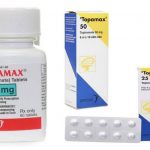What Not To Take With Topiramate (Topamax)

Topiramate sold under the brand name Topamax is a medication that belongs to the family of medications called antiepileptic drugs (AEDs). AEDs are generally used for neurologic and psychiatric purposes. The primary indication for this family of drugs is for seizure disorders; hence the name “antiepileptic drugs.” These are classically used as mood stabilizers in psychiatry, although their administrations have seen a broader application.
Specifically, topiramate is an anticonvulsant drug that was initially FDA approved in 1996 for the treatment of monotherapy epilepsy, adjunctive therapy epilepsy, and migraine disorder. It has received approval for monotherapy in epilepsy in those two years or older with primary generalized onset tonic-clonic seizures or partial-onset seizures. Adjunctive therapy is an approved use for adults and pediatric populations ages 2 to 16 years old with primary generalized onset tonic-clonic seizures, partial-onset seizures, and in those two years or older with Lennox-Gastaut syndrome associated seizures. For migraine disorder, topiramate has approval for prophylaxis in adultS. For individuals with a body mass index over 30, topiramate has approval for chronic weight management.
There are many off-label uses for topiramate, including neuropathic pain, psychotropic drug-induced weight gain, alcohol use disorders with tobacco dependence, cluster headache prevention, binge eating disorder, bulimia nervosa, obesity with hypertension, prevention of neuralgiform attacks, adjunctive therapy in bipolar disorder, unipolar depression, borderline personality disorder, obsessive-compulsive disorder, posttraumatic stress disorder, Tourette syndrome, Prader-Willie syndrome, essential tremor.
What is a drug interaction?
A drug interaction can be defined as an interaction between a drug and another substance that prevents the drug from performing as expected. This definition applies to interactions of drugs with other drugs (drug-drug interactions), as well as drugs with food (drug-food interactions) and other substances.
Whenever two or more drugs are being taken, there is a chance that there will be an interaction among the drugs. The interaction may increase or decrease the effectiveness of the drugs or the side effects of the drugs. The likelihood of drug interactions increases as the number of drugs being taken increases. Therefore, people who take several drugs are at the greatest risk for interactions. Drug interactions contribute to the cost of healthcare because of the costs of medical care that are required to treat problems caused by changes in effectiveness, or side effects. Interactions also can lead to psychological suffering that can be avoided. This review discusses the issue of drug interactions and several ways to avoid them.
How should I take topiramate?
Follow all directions on your prescription label and read all medication guides or instruction sheets. Your doctor may occasionally change your dose. Use the medicine exactly as directed.
Topiramate can be taken with or without food.
Swallow the tablet whole and do not crush, chew, or break it. The Trokendi XR extended-release capsule must be swallowed whole. Do not break or open.
If you cannot swallow a Qudexy XR or Topamax Sprinkle Capsule whole, open it and sprinkle the medicine into a spoonful of applesauce or other soft food. Swallow the mixture right away without chewing. Do not save it for later use.
Carefully follow the swallowing instructions for your medicine.
Topiramate doses are sometimes based on weight in children. Your child’s dose needs may change if the child gains or loses weight.
Drink plenty of liquids while you are taking topiramate, to prevent kidney stones or an electrolyte imbalance.
You will need frequent medical tests. If you need surgery, tell the surgeon ahead of time that you are using topiramate. Any medical care provider who treats you should know that you take seizure medication.
Do not stop using topiramate suddenly, even if you feel fine. Stopping suddenly may cause increased seizures. Follow your doctor’s instructions about tapering your dose.
Call your doctor if your seizures get worse or you have them more often while taking topiramate.
What Not To Take With Topiramate (Topamax)
Before taking topiramate oral tablets, be sure to tell your doctor about all medications you take, including prescription and over-the-counter types. Also describe any vitamins, herbs, or supplements you use. Your doctor or pharmacist can tell you about any interactions these items may cause with topiramate oral tablets.
According to Healthline, topiramate oral tablets can interact with several types of drugs including:
• contraceptive drugs that contain estrogen,* such as:
o certain birth control pills
o patches
o vaginal ring
• certain other seizure medications, such as:
o carbamazepine (Tegretol)
o phenytoin (Dilantin)
• central nervous system depressants (drugs or substances that slow down the activity of your brain and spinal cord), such as:
o alcohol
o opioid pain relievers, such as oxycodone
o benzodiazepines, such as alprazolam (Xanax)
o sedatives, such as zolpidem (Ambien)
• certain medications used to treat mental health conditions, such as lithium
This list does not contain all types of drugs that may interact with topiramate oral tablets. Your doctor or pharmacist can tell you more about these interactions and any others that may occur with use of topiramate oral tablets.
* Topiramate can decrease the effectiveness of birth control drugs that contain estrogen. (Ethinyl estradiol is a form of estrogen that’s often an active ingredient in birth control pills, patches, or rings.) If you become pregnant while you’re taking topiramate, you’ll have an increased risk for fetal development problems or low birth weight. If you’re able to become pregnant, talk with your doctor about effective birth control options before taking topiramate.
Other interactions
Topiramate oral tablets can interact with supplements. The drug can also be affected by your diet.
Interactions with supplements
There aren’t any specific interactions known to occur between herbal supplements and topiramate oral tablets.
But some herbal supplements may have central nervous system depressant effects. (They can slow down the activity of your brain or nerves.) Topiramate works by reducing the activity of your brain. So, using topiramate with other treatments that do this may reduce your brain activity too much. And this can lead to adverse effects.
It’s important to ask your doctor or pharmacist before taking any herbs or dietary supplements while you’re taking topiramate.
Interactions with foods
There aren’t any specific foods that are known to interact with topiramate oral tablets.
But while you’re taking topiramate, it’s best to avoid the ketogenic diet (a high-fat, low-carb diet). The ketogenic diet could increase your risk for kidney stones with topiramate. It also increases your risk for metabolic acidosis (high acid level in your blood).
It’s also important to stay well-hydrated while you’re taking topiramate. Drinking plenty of fluids with this medication can reduce your risk for kidney stones.
Warnings
Topiramate oral tablets may not be right for you if you have certain medical conditions or other factors that affect your health. Talk with your doctor about your health history before you take topiramate oral tablets. Factors to consider include those in the list below.
• Kidney disease or kidney stones. If you’ve had kidney stones or other kidney problems, you could have a higher risk for kidney stones with topiramate. You could also have an increased risk for metabolic acidosis (high acid level in your blood). If you’ve had kidney stones or other kidney problems, your doctor may recommend a different treatment option for your condition. Or they may check certain blood tests during your treatment to monitor your acid level and kidney health.
• Liver problems. If you’ve had liver problems, topiramate may increase your risk of having a high level of ammonia in your blood. Your doctor may use certain blood tests during your treatment to monitor your liver health and ammonia level.
• Glaucoma or other eye problems. Topiramate can possibly cause eye and vision problems, including glaucoma (increased pressure in your eye). If you already have glaucoma or other eye problems, taking this drug could worsen your condition. Your doctor may recommend having your eyes monitored more carefully during treatment with topiramate.
• Breathing problems. If you have a history of any breathing or lung problems, these conditions may increase your risk for metabolic acidosis. Because topiramate can also cause metabolic acidosis, you may have an increased risk for this side effect.
• Suicidal thoughts or behaviors. Taking topiramate may raise your risk for suicidal thoughts or behaviors. If you’ve had suicidal thoughts or behaviors, depression, or mood problems, your doctor may monitor you more closely while you’re taking topiramate.
• Weak or soft bones. If you’ve had bone problems, such as osteoporosis, topiramate treatment could possibly make your condition worse. This can further weaken your bones and increase your risk of broken bones. Your doctor may recommend certain tests to monitor your acid levels and bone health if they prescribe topiramate for you.
• Ketogenic diet. Following a ketogenic diet (a high-fat, low-carb diet) isn’t recommended while you’re taking topiramate. This diet could increase your risk for kidney stones with topiramate. It could also increase your risk for metabolic acidosis. If you follow a ketogenic diet, talk with your doctor about other treatment or diet options.
• Allergic reaction. If you’ve had an allergic reaction to topiramate oral tablets or any of their ingredients, you shouldn’t take topiramate oral tablets. Ask your doctor whether any other medications may be better options for you.
Use with alcohol
Drinking alcohol isn’t recommended while you’re taking topiramate oral tablets. Alcohol can increase your risk for certain side effects of topiramate, such as:
• nausea
• diarrhea
• problems with speaking, confusion, or memory
• dizziness
• sleepiness
• slowed reactions
Additionally, an interaction between topiramate and alcohol could increase your risk for serious side effects. These include:
• slowed breathing
• loss of consciousness
• coma
• rarely, death
If you have questions about alcohol use with topiramate, talk with your doctor.
Pregnancy and breastfeeding
It’s recommended that you don’t use topiramate oral tablets during pregnancy.
This is because taking topiramate during pregnancy can be harmful. Studies show that babies born to people who took topiramate during pregnancy had an increased risk for:
• a development problem known as cleft lip or cleft palate
• low birth weight, which can cause breathing problems and other health concerns if you’re pregnant or planning to become pregnant, talk with your doctor about the safety of topiramate oral tablets.
If you take topiramate while breastfeeding, this drug will pass into your breast milk. This means that the drug can affect a child who’s breastfed.
There’ve been reports of diarrhea and excessive sleepiness in children who were breastfed whose mothers took topiramate.
If you’re breastfeeding or planning to breastfeed, discuss the risks and benefits with your doctor.





